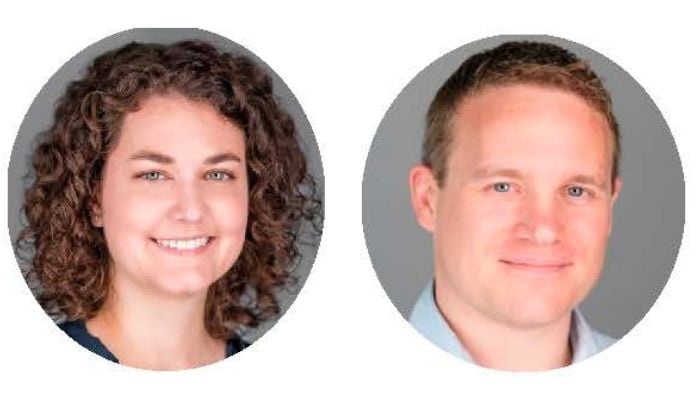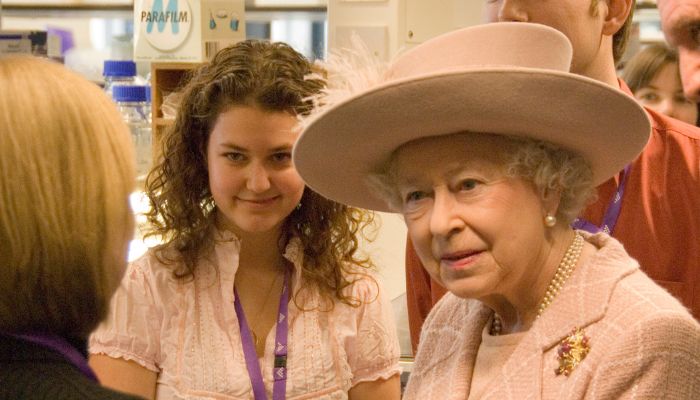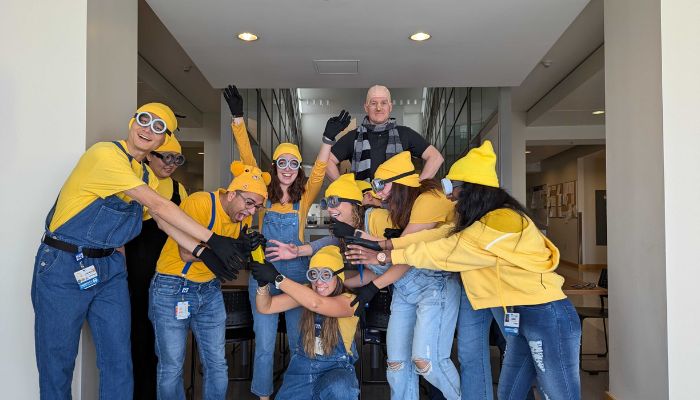Getting to Know Gina Denicola, PhD & Florian Karreth, PhD
Date Posted: jueves, diciembre 05, 2024
We are pleased to announce two MetNet speakers on Wednesday, December 18. Gina Denicola, PhD, and Florian Karreth, PhD, are a couple who are both Associate Professors at the Moffitt Cancer Center.
Gina did her PhD studies at UPenn and Cambridge Research Institute, where in a seminal study she discovered a role for Nrf2 in ROS detoxification and tumorigenesis. She then continued looking into Nrf2 in her postdoc research in Lew Cantley’s lab at Cornell, where she uncovered its role in regulating serine biosynthesis. In her independent lab, she is a world leading expert in the roles of not only Nrf2, but serine and cysteine metabolism in cancer. She currently serves as Interim Chair of the Department of Metabolism and Physiology, and was the recipient of numerous awards including the V Foundation and CBE Program Innovation Award.
Florian conducted his PhD research at University of Vienna and Cambridge Research Institute, making key discoveries the roles of Raf signaling in lung cancer and melanoma. His postdoctoral research investigated BRAF gene canonical and noncanonical roles in melanoma and lymphoma. As an independent PI he investigates noncoding RNAs and signaling mechanisms in melanoma initiation and progression utilizing a cutting-edge ES cell genetically engineered mouse model platform (ES-GEMM) developed in his lab. His numerous awards include the Melanoma Research Alliance Young Investigator Award and Cancer Biology & Evolution Program Innovation Award.
We ask our visiting MetNet speakers various scientific and nonscientific questions, and Gina and Florian graciously obliged and answered as a couple.
What are some of your favorite, and/or least favorite, aspects of being a scientist couple?
Gina: The best and worst part of being a scientist couple for me is talking about science away from the lab. Florian never turns it off, so it’s great when I want to bounce ideas off him, but terrible when I just need to turn my brain off.
Florian: Because our careers were in sync from grad school to tenured faculty, we struggled with the same issues at the same time. A sorrow shared is a sorrow halved.
What are some memorable moments during your research training or as an independent PI?
Florian: When Gina and I were postdocs, we once dared another postdoc to drink a miniprep’s worth of E. coli bacterial culture for about $100. To our surprise, he did it. As far as we are aware, there were no lasting health implications, and we will never know if some of his intestinal cells are now GFP positive. (Please don’t do this)
Gina: I met Queen Elisabeth II when she came to officially open the then new Cancer Research UK Institute in Cambridge where we were grad students.

Looking back on your path so far, any advice for trainees?
Gina: Your science network is just as important as the experiments you are doing in the lab. Your network will be your future collaborators, letter writers, biggest supporters, and contacts for future jobs. Try to meet as many people as possible within your institution and when you attend conferences.
Florian: Recognize the difference between ‘interesting’ and ‘important’. There are a lot of interesting questions one could address, but they tend to distract from the important questions that one should focus on. Also, always strive to do meticulous and rigorous science. Having a reputation as a careful scientist is so much more valuable than a flashy CNS paper here and there.
What is unique about the Karreth lab environment such as funny lab traditions?
Gina: Every year the DeNicola lab attends the Florida state fair for farm animal viewing, unhealthy food eating, and carnival rides - especially bumper cars!
Florian: This is probably not unique, but we celebrate achievements with champagne. I collect bottles and label them. Also burgers & beer outings. We have an annual labbiversary breakfast, and we do themed Halloween costumes. We’ve done Indiana Jones and Lara Croft, Squid Game, and this year was Despicable Me.]

What are your best science-related & non-science habits?
Gina: My best science-related habit is that I’m incredibly organized. I love making lists and getting things done way ahead of deadlines. This does not translate to my everyday life for some reason. My best non-science habit is probably that I get plenty of sleep. Sleeping is a talent for me.
Florian: Science habit, I ask questions after seminars, a lot. Non-science, I plan to exercise a lot, emphasis on ‘plan’.
Your idea of a perfect relaxing day outside of work?
Florian: This will make some worry about my work/life balance, but I really enjoy reading papers by the pool. I just don’t have enough time at work for deep dives into the cool science that is out there.
Gina: Same but with a book. No science on my relaxing days!
What hidden talent do most people not know about you?
Gina: I have a black belt in Karate and a green belt in Tae Kwon Do.
Florian: I worked as a ballroom dancing instructor in college.
What do you wish you could do if you had more free time?
Gina: Cook. I enjoy cooking complicated dishes but there never seems to be enough time. We usually just eat simple things.
Florian: Travel and try cuisines from all over the world.
What profession do you think you would have if you weren’t a scientist?
Florian: I’d probably be a surgeon.
Gina: No way, you have no finesse.
Florian: … specialized on amputations.

